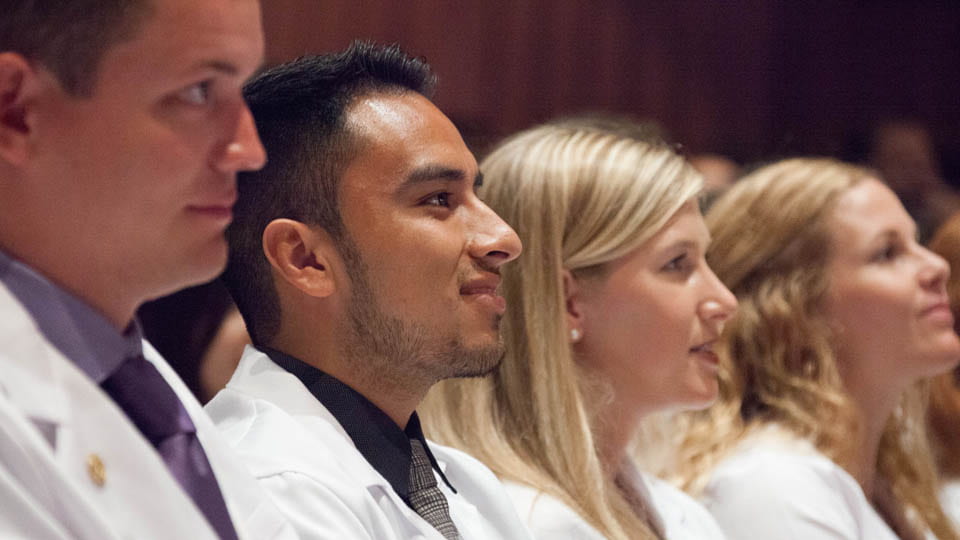A doctor-to-be without borders
UCI’s first undocumented medical student, Oscar Hernandez is determined to serve the Latino community

Despite his immigration status and uncertain finances, first-year University of California, Irvine medical student Oscar Hernandez will not let his dream of becoming a doctor be deferred.
That perseverance has already helped him overcome several obstacles. Hernandez was 18 months old when his parents carried him into the U.S. from Mexico and settled in San Diego’s Barrio Logan. He grew up poor but credits his mother and father for instilling in him a hard-work ethic and the belief that education is the key to turning ambitions into reality.
In 2014, Hernandez became the first in his family to earn a college degree, after needing to drop out for two years and work three low-wage jobs to pay off tuition debt and afford to go back for his final year at UC San Diego. And this August, he became UCI’s first undocumented medical student.
“Becoming a physician is more than just a lifelong dream,” says Hernandez, 26. “It’s a commitment that I’m making for my community.”
He had kept his undocumented status a secret until the Obama administration enacted the Deferred Action for Childhood Arrivals policy in 2012. DACA allows certain undocumented immigrants who entered the country before their 16th birthday and before June 2007 to receive renewable, two-year work permits and exemption from deportation. It does not confer legal immigration status or provide a path to citizenship.
“It was a vision of hope that encouraged my parents to migrate to the land of opportunity,” Hernandez says. “We settled in a trailer park in the midst of high crime rates and poor educational resources. I quickly learned that it would take more than just learning English to create a voice for myself. Education was my escape.”
Studying kept him busy and away from the gangs and crime in his neighborhood. By the time he turned 8, he was commuting on two buses and a trolley car and walking nearly 2 miles daily to get to a higher-performing school that challenged his intellect. Hernandez excelled there and later was selected to attend The Preuss School, a charter middle and high school on the UCSD campus for low-income students who strive to become the first in their families to earn a college degree.
He took honors courses and, upon graduation, was admitted to UCSD, where he continued moving closer to the goal he’s pursued since he was a child, when he helped his mother clean the house of a doctor who inspired him and told him that anything was possible.
Getting this far has not been easy. As an undergrad, Hernandez and his parents, who owned a small party rental shop, raised the money for his tuition. Then the store faltered, the bills piled up, his parents divorced, and he had to temporarily quit school. But over the two years Hernandez sold tacos, tended a laundromat and helped his mother rebuild the party rental business, he never relinquished his dream of becoming a doctor.
Even in the face of adversity, “Oscar’s self-reliance, determination and motivation were clearly demonstrated in how he managed to graduate from UCSD with impressive grades after taking a break to earn the money to pay for his college education,” says Jose Rea, administrative director and academic coordinator for UCI’s Program in Medical Education for the Latino Community.
To qualify for medical school, Hernandez enrolled in the one-year UC Postbaccalaureate Consortium, which he completed this summer. He then was accepted into UCI’s School of Medicine as a PRIME-LC student. The program was the first in the country to focus on increasing the number of physician-leaders who are culturally sensitive and linguistically competent to address the specific needs of Latinos.
“Most people would not do anything like what Oscar did, working three below-minimum-wage jobs in order to pay his tuition debt,” Rea says. “I’ve never heard of such a thing – that level of commitment and sacrifice – in the 25-plus years I’ve been advising students. But I’m confident that this man, who is extremely focused, humble and self-reliant, will figure out a way to stay in medical school, overcome any barriers and be an outstanding physician. He’s a trailblazer.”
As a DACA student, Hernandez is not eligible for any of the federal loans available to his peers. This leaves him with a significant financial hurdle. Fees and living expenses for four years of medical school could be in excess of $230,000, and classroom and clinical work leaves no time for a side job.
Through a Dean’s Merit Scholarship and a PRIME-LC stipend, the School of Medicine is helping to cover costs, and a state grant will provide further assistance. To raise the rest, Hernandez has started a GoFundMe account, which he hopes will permit him to finish medical school without having to take another money-making break.
Nothing, though, will deter him from reaching his ultimate goal, he says. “My life experiences have given me a front-row seat to crucial issues affecting so many families worldwide, and medical school will let me share my knowledge, passion and skill with my community – the underserved – and it will allow me to create a voice for their rights and health,” Hernandez says. “I know that for me to make change in the world, it will be through medicine.”